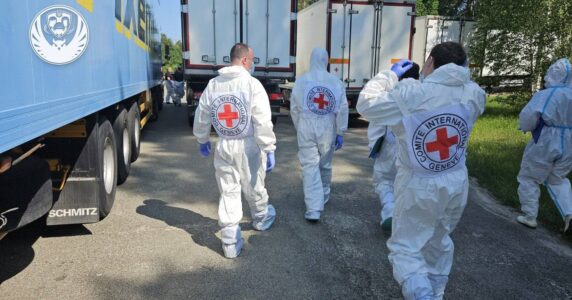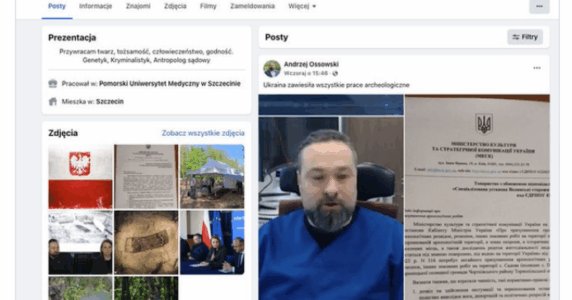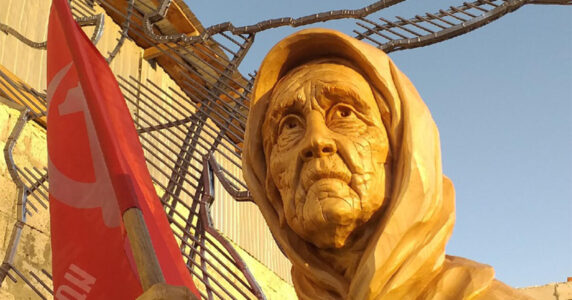Navigation and useful materials
What’s happening under the guise of “expression of people’s will” in the Ukrainian territories temporarily occupied by Russia
Russia held elections to its State Duma of the 8th convocation, as well as regional and local elections, on September 17–19. There was no real opposition, since it had all been eliminated beforehand, but instead, the elections included new “Russians” from the “ORDLO.” They have become an electoral milch-cow for the Russian ruling party, whose popularity has taken quite a tumble as of recent.
Back in 2009, Russia was included in a group of countries with a “consolidated authoritarian regime,” as described by the international non-profit Freedom House, alongside Turkmenistan, Uzbekistan, Tajikistan, and Belarus. Still, Russia tried to at least maintain the façade of democracy. But after last year’s events in Belarus, the Kremlin abandoned even that—for fear of having history repeat in Russia.
According to the report by the Liberal Mission Foundation, the Russian authorities decided to forgo the policy of inhibiting opposition and went directly for its destruction.
The first serious signal of intensifying cruelty of the Russian authorities towards the opposition was the attempt to assassinate Alexei Navalny (poisoning with a chemical agent in August 2020) and his subsequent imprisonment in January 2021.
His Anti-Corruption Foundation was included into the list of extremist and terrorist organizations and terminated. This resulted in hundreds of people being prosecuted. The State Duma soon banned members of extremist organizations, as well as those who donated money to them, from running for office. This way, Navalny’s allies would not get elected. Many have left the country, some have been imprisoned.
The Russian outlet Important Stories counted how many candidates were not allowed to run for office in Russia during the past 15 years, and found that candidates who are not members of the so-called “system parties” were denied registration ten times more often.
According to the Movement for the Protection of Voters’ Rights “Voice,” since 2007, the Central Election Commission (CEC) of the Russian Federation has denied registration to 120,000 people. Out of them, only 20,000 belonged to “system parties,” while the other 100,000 were candidates from independent parties or independent candidates. Stanislav Andriychuk, co-chair of “Voice,” notes that elections where so many candidates are banned cannot be considered a reflection of the real will of Russian citizens.
Dmitry Gudkov, the only member of the State Duma of the previous 6th convocation (December 21, 2011—September 18, 2016) who openly belonged to the opposition, intended to take part in the last parliamentary elections. Surveys showed his ratings were quite high. However, a criminal case was opened against Gudkov. Due to the risk of arrest, he had to flee the country.
There are also some more “creative” methods used in Russia against opposition politicians. For example, the parents of 19-year-old law student Darya Artamonova, a candidate for the Berdsk City Council, received a funeral wreath in the name of their daughter.
In the elections to the Legislative Assembly of St. Petersburg, three candidates with the same first and last name—Boris Vishnevsky—ran for one seat. Not only did they have the same first and last name, but they also had the same beard and were all bald. Among them is the real Boris Vishnevsky, one of the most prominent opposition representatives of the St. Petersburg parliament. And the other two are his clones who have only changed their names and appearance very recently.
To help you feel the special atmosphere of the Russian elections, we have collected some headlines:
- “Head of Ingushetia Mahmud-Ali Kalimatov Votes in Elections and Dances Lezghinka Right Outside Polling Station”
- “Family in Ryazan Comes to Polling Station Dressed as Russian Folk Tale Heroes Yevpaty Kolovrat and Avdotya Ryazanochka”
- “82-Year-Old Retired Man in Bashkiria Votes in Duma Elections and Does Leg Split Right at Polling Station”
- “In Ryazan Oblast, Voter Comes to Station in Wetsuit and Flippers”
- “In Chuvashia, Head of Commission Eats Document Following Allegations of Forgery”
- “In Petersburg, Police Beats Candidate with Disability after He Calls It to Report Disappearance of Ballots”
Although the ruling party is expected to take first place in the election, its chair, Dmitry Medvedev, did not appear at the election headquarters due to an unknown illness. Sergey Lavrov and Sergey Shoigu, who are at the top of the list, did not show up as well. Allegedly because they were “busy.”
A much more plausible explanation for this eloquent absence is the fact that the party did not exactly triumph: according to exit polls, United Russia is getting 45.2% of the votes, while at the previous elections in 2016, the score was 54.17%.
In addition, the ruling leadership could have trouble with “problematic” districts at night. For example, throughout the night, the voting results in Moscow remained a mystery: they were not published, but information appeared that United Russia lost, yet it would be given a win anyway.
Apparently, after the events in Belarus, the Russian authoritarian regime not only learned the need for cruelty for the sake of self-preservation, but also realized that it can be dangerous to overdo it. On the one hand, it needed a “confident victory,” on the other hand, this victory had to be credible.
According to exit polls, the Communist Party is gaining about 21% of the vote—50% more than in 2016.
For many years, the Communist Party, the Liberal Democratic Party and “Fair Russia” were an important part of the political system. Completely loyal to the country’s leadership, they created the illusion of choice and gathered protest votes. For their loyalty, they got more-less guaranteed election results and the opportunity to put sponsors on their lists.
But this tacit agreement with the systemic (manageable) no longer works, as noted by the Moscow Carnegie Center back in 2019. A tumble in the ratings and citizens’ readiness to vote even for spoiler candidates out of protest led to the Kremlin starting to be suspicious even of its loyal opposition, blaming it for the Kremlin’s own fails.
Although Grudinin, as a presidential candidate from the Communist Party in 2018, did not allow himself anything “extra” and behaved as loyally as possible towards the Kremlin, it did not help: the Kremlin responded as if he had seriously challenged the authorities. They started squeezing him out of politics—at these recent elections, the Central Electoral Commission removed him from the Communist Party list for the State Duma.
In general, the Communists have been the main target of Kremlin propaganda attacks in this election. It was probably due to concerns that the Communist Party might go beyond its electoral reservation, and eventually become uncontrolled.
How does it help Ukraine? The position of the Communist Party on Crimea or Donbas is no different from the position of the Kremlin. Zyuganov even urged Putin to invade Ukraine “officially.”
But at the grassroots level, the party has attracted a variety of people, including not-so-obvious candidates who want to fulfill their potential in politics and are critical of the Kremlin politics. For example, the candidate to the State Duma from the Communist Party Nikolay Bondarenko supported returning Crimea to Ukraine. He expressed major doubts about the real data of the 2014 “referendum” and went so far as to say that most Russians regretted the occupation of the peninsula since it had done them no good.
If the conflict between the Communist Party and the ruling party deepens, the same can be expected regarding the policy of aggression. Still, we can hardly expect a serious transformation from the heirs of the Bolsheviks.
For the second time, the occupying power is holding elections to the State Duma on the Crimean Peninsula. Ukraine, the USA, the EU and many other countries consider them illegal.
The Ministry of Foreign Affairs of Ukraine called on foreign states and international organizations to “strongly condemn Russia’s illegal actions, clearly declare non-recognition of the election results in the temporarily occupied territories of Ukraine and the illegitimacy of the State Duma thus formed, and increase political and diplomatic pressure on the Russian Federation, particularly through expanding sanctions imposed on it.”
Some individuals who once were remarkable representatives of collaboration with the occupying power are no longer needed by their Moscow masters.
Back in March, Natalia Poklonskaya planned to run for the State Duma again. But not even the high ratings helped her: United Russia did not put her on the list, allegedly because Poklonskaya voted against Putin’s pension reform.
A similar story happened to Olga Timofeyeva, whose phrase about “stones from the sky” became a meme online. “We had a billboard about that. The Russian flag, and it said, ‘What’s next? Even if stones fall from the sky, we’re in Russia.’ This position of the people of Sevastopol is inviolable,” said Timofeyeva in the studio of the Russian-controlled Sevastopol TV channel in 2014. Now, Timofeyeva was denied registration for elections.
According to Krym.Realii, so-called “people’s mayor” of Sevastopol Alexei Chaly also ended up out of big politics. Back in 2014, he was sitting next to Putin at the table during the signing of the so-called “agreement on the accession of Crimea to Russia.” Now, Chaly is not even running for Duma.
“All these people are waste material,” explains political scientist from Crimea Yevhenia Horiunova.
Another feature of the 2021 elections in Crimea is that there is not a single Crimean Tatar candidate who stands a chance.
“What does it mean? In 2016 Ruslan Balbek was in the State Duma, but now there will be no Crimean Tatars in the State Duma, there definitely won’t be a single one. And this suggests that the Russians are completely disregarding the Crimean Tatar factor. They are effectively removing Crimean Tatars from the political sector. Perhaps, this is retaliation for Crimean Tatars not supporting Russia,” says Horiunova.
Then who is allowed to gain political power? Participants of the hybrid war in Donbas.
Alexander Borodai, the former so-called “prime minister” of the so-called “Donetsk People’s Republic” and the leader of the public movement “Union of Volunteers of Donbas” (SDD), will most likely represent United Russia in the Rostov region—following his organization entering into an agreement with the ruling party. The agreement was reported by secretary of the general party council Andrey Turchak in May this year, before his visit to Donetsk. Turchak claimed they had common goals and objectives with the SDD. According to Borodai, he, in turn, decided to run with the help of United Russia, because it is “the party of the president, our supreme commander,” who is supported by “all SDD volunteers.”
What is also important for the Russian authorities is the opportunity to get the support of “DPR” and “LPR” residents with Russian passports at Duma elections.
According to Novaya Gazeta, it was initially expected that the leader of the militants, Zakhar Prilepin, would fight for the votes from the “people’s republics.” Rumor had it Prilepin would run for the State Duma in the Rostov region.
However, according to political technologist Abbas Gallyamov, the weakness of the ruling party’s position forced a change of approach in the occupied territories of Donbas: “At first, the Kremlin believed that the situation of United Russia was not so bad, so they decided to send Prilepin to the Fair Russia party. As the election day was getting nearer, they started panicking because of the ratings. So, they decided they would need the votes of DPR and LPR residents themselves.”
On September 8, a week and a half before the election, a political unit landed in Donetsk—the leadership of the Russian ruling party held a rally of its supporters here. State Duma member from the ruling party Dmitry Sablin, while in occupied Donetsk, said that “an experiment on reunification of the territory with Russia is underway in Donbas.” The key stage of this “experiment” is participation in the Russian elections.
New “Russians” from the “ORDLO” voted en masse in the Rostov region. Some received their Russian passports right before voting. 825 buses and 12 trains were organized from the occupied territory.
In addition, they were allowed to vote online. You can see the process in the published video, where an unknown man, probably an employee of a municipal organization in Alchevsk, demonstrates how he votes for United Russia on the accounts of residents of the “ORDLO.” To “vote,” the man uses a database with personal data of the voters—it contains all the necessary logins and passwords to enter the Russian portal of public services.
In the video, he first says that he is recording “a report for the Central Electoral Commission,” then—that it is a report for the “operational headquarters in Luhansk.” He also complains that the voting procedure turned out to be more complicated than what was taught “at seminars,” and the voting system “tends to freeze.” At one point, he says, “If everyone really voted for themselves, it would all be impossible.”
If you have found a spelling error, please, notify us by selecting that text and pressing Ctrl+Enter.


